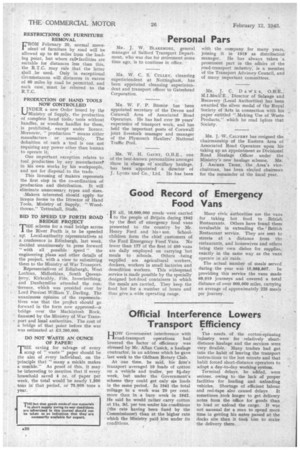Official Interference Lowers Transport Efficiency
Page 22

If you've noticed an error in this article please click here to report it so we can fix it.
• UOW Government interference with 'road-transport operations had lowered the factor of efficiency was stressed by Mr. Allan Cusick, a haulage contractor, in an address which he gave last week to the Oldham Rotary Club.
At one time, he said, his firm's transport averaged 10 loads of cotton on a vehicle and trailer, per 5i-day week, but under the Government's scheme they could get only six loads in the same period. In 1941 the total year. mileage in a week was 20 per cent. more than in a busy week in 1942. He said he would rather carry cotton at Ils. 3d. per ton under his conditions (the rate having been fixed by the Commissioner) than at the higher rate which the Ministry paid him under its conditions. The needs of the cotton-spinning industry were for relatively shortdistance haulage and the services were very flexible. Many traders had got into the habit of leaving the transport instructions to the last minute and that habit forced short-distance operators to adopt a day-to-day working system.
Terminal delays, he added, were serious, owing to the lack of proper facilities for loading and unloading vehicles. Shortage of efficient labour
and red-tape also caused delays It sometimes took longer to get delivery notes from the office for goods than to load or unload the cargo. It was not unusual for a man to spend more time in getting his notes passed at the docks site than it took him to make the delivery there.




























































